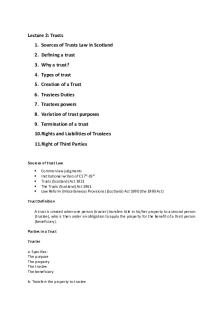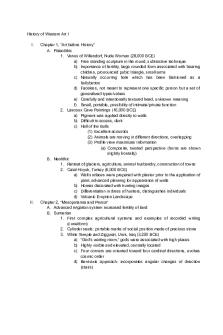Ws2 - notes PDF

| Title | Ws2 - notes |
|---|---|
| Course | Law Of Organisations |
| Institution | University of Law |
| Pages | 6 |
| File Size | 110.6 KB |
| File Type | |
| Total Downloads | 32 |
| Total Views | 159 |
Summary
notes...
Description
Effects of separate legal personality Case 1: Macaura v northern assurance co ltd Facts: m sold timber to ics for all the shares in ics. M insured timber in own name. fire burnt timber. Insurance invalid as in his namecompany owned timber so should not be in his name it should be in companies. 1. he was creditor of company, owned almost all shares 2. they owned the timber, insurable interest? 3. the corporator even if he holds all the shares is not the corporation, and that neither he nor any creditor of the company has any property legal or equitable in the assets of the corporation. NO PIERCING OF VEIL BECAUSE SEPARATE LEGAL ENTITIES- one person owning shares doesn’t make him the company
Case 2: Lee v Lee’s Air farming ltd Facts: Mr lee was majority shareholder and sole director. Killed in a plane crash. His wife tried to claim compensation for his death under workers compensation act 1922. Needed to be ‘worker’ to qualify. 1. Lee with Lees Air Farming ltd 2. Lee acting as agent for company as governing director 3. employee MR LEE IS NOT THE COMPANY- IT HAS ITS OWN LEGAL PERSONALITY AND THEREFORE HE IS A WORKER. NOT PIERCED THE VEIL OF INCORPORATION.
Case 3: adams v cape industries plc 1.Yes- There is no general principle that all companies in a group of companies are to be regarded as one. On the contrary, the fundamental principle is that "each company in a group of companies (a relatively modern concept) is a separate legal entity possessed of separate legal rights and liabilities. It is thus indisputable that each of Cape, Capasco, N.A.A.C. and C.P.C. were in law separate legal entities. Mr. Morison did not go so far as to submit that the very fact of the parent-subsidiary relationship existing between Cape and N.A.A.C. rendered Cape or Capasco present in Illinois. Nevertheless, he submitted that the court will, in appropriate circumstances, ignore the distinction in law between members of a group of companies treating them as one, and that broadly speaking, it will do so whenever it considers that justice so demands. In this case he wouldn’t do this however- separate companies. 2.Even if economic unity exists it doesn’t mean we should ignore the fact they are separate legal entities. 3.Group is like a partnership not like a group of parent/subsidiarys. If there is a genuine relationship of agency then that is a way to get around piercing the corporate veil because you can rely on these agency principles instead.
Case 4: chandler v cape plc FACTS: chandler employed by subsidiary company between 19591962. Discovered he had asbestosis in 2007, but subsidiary no longer existed and didn’t have insurance. Chandler brought claim against parent company Cape Plc. GENERAL RULE: a duty to intervene to prevent damage to another would arise where there was a relationship between the parties which gave rise to an imposition or assumption of responsibility on
the part of the defendant; that, while a subsidiary and its parent company were two separate entities and there was no imposition of responsibility by reason only that a company was the parent of another company, it was not necessary for the parent company to have absolute control of its subsidiary before a duty of care could exist… HOWEVER: the law might impose on a parent company responsibility for the health and safety of the employees of a subsidiary, where, as in the present case, the businesses of the two companies were in a relevant respect the same and the parent (i) had, or ought to have had, superior knowledge on some relevant aspect of health and safety in the particular industry, (ii) knew, or ought to have known, that the subsidiary's system of work was unsafe, and (iii) knew, or ought to have foreseen, that the subsidiary or its employees would rely on its using that superior knowledge for the employees' protection In this case: The defendant accepted that the subsidiary company, which had been dissolved, had failed in its duty of care to the claimant. The trial judge found, on the evidence, that throughout the period when the claimant had been employed by its subsidiary the defendant had employed a group medical adviser, responsible for the health and welfare of all employees within the group of companies of which it was a parent, and a scientific officer, who was involved in seeking ways of suppressing asbestos dust; and that many aspects of the production process had been discussed and authorised by the defendant's board. Given that evidence, the judge held that the claimant had established a sufficient degree of proximity to the defendant company for it to be fair, just and reasonable to impose a duty of care on the defendant to protect the claimant from harm from the asbestos atmosphere. Didn’t pierce veil but had same effect.
Case 5: Petrodel Resources v Prest DURING DIVORCE SHE ARGUED PROPERTY OWNED BY PETRODEL WERE THOSE OF HER HUSBANDS: BASE 1: the court could pierce the corporate veil for the purpose, and only for the purpose, of depriving that company or its controller of the advantage which they would otherwise have obtained by the company's separate legal personality; but that the legal interest in the disputed properties was vested in the companies and, whatever the husband's reasons for organising matters in that way, there was no evidence that he was seeking to avoid any obligation which was relevant in the present proceedings; and that, accordingly, there was no justification as a matter of general legal principle for piercing the corporate veils of the companies- HUSBAND USED COMPANY TO HOLD LEGAL TITLE TO PROPERTY HE WAS BENEFICIALLY ENTITLED TO- NOT SUCCESSFUL BASE2: by virtue of section 24(1)(a) of the Matrimonial Causes Act 1973- was nothing in the 1973 Act, or in its purpose or broader social context, to indicate that the legislature had intended to authorise the transfer by one party to the marriage to the other of property which was not his to transfer; that such a transfer would ordinarily be unnecessary for the purpose of achieving a fair distribution of the assets of the marriage since, if assets belonged to a company owned by one party to the marriage, the proper claims of the other could ordinarily be satisfied by directing the transfer of shares. section 24(1)(a) did not give the judge power to order the husband to transfer to the wife property to which he was not in law entitled. HUSBAND FAILED TO DISCLOSE FINANCIAL POSITION FULLY AND FRANKLY. – UNSUCCESSFUL.
BASE3: the companies could be ordered to convey the seven disputed properties to the wife under section 24(1)(a) of the 1973 Act if the properties belonged beneficially to the husband by virtue of the particular circumstances in which they had come to be vested in the companies; ARGUED COMPANY HOLDING PROPERTY ON TRUST FOR HER HUSBAND THEREFORE HE HAD BENEFICIAL INTEREST MEANING SHE HAD EQUITABLE INTEREST IN PROPERTY.SUCCESSFUL DIDN’T PIERCE VEIL OF INCORPORATION WENT ‘AROUND THE HOUSES’
CASE 6: JONES V LIPMAN Facts: agreed to sell freehold land to claimant but whilst in process of doing so sold it to company owned and controlled by him to try and avoid sale 1. 1st defendant LIPMAN owned property at time of sale 2. transferred to company owned and controlled wholly by 1st defendant LIPMAN 3. company ‘mere cloak or sham’ - I agree with the finding by the learned judge that the defendant company was a mere channel used by the defendant Horne for the purpose of enabling him, for his own benefit, to obtain the advantage of the customers of the plaintiff company. TRYING TO AVOID SPECIFIC PERFORMANCE- HAPPY TO PAY DAMAGES NOT GIVE HIM THE PROPERTY
4. no because court ordered performance from company- saw through the sham and said it did not matter EXAMPLE OF PIERCING THE VEIL OF INCORPORATION- company purely a sham set up purely to avoid the court being able to order specific performance...
Similar Free PDFs

Ws2 - notes
- 6 Pages

Insolvency WS2 Final Notes
- 18 Pages

WS2 Visitors WORSHOP
- 12 Pages

Notes
- 18 Pages

Notes
- 12 Pages

Notes
- 61 Pages

Notes
- 35 Pages

Notes
- 19 Pages

Notes
- 70 Pages

Notes
- 6 Pages

Notes
- 35 Pages

Notes LAW121 (A+ NOTES!)
- 99 Pages

Notes
- 29 Pages
Popular Institutions
- Tinajero National High School - Annex
- Politeknik Caltex Riau
- Yokohama City University
- SGT University
- University of Al-Qadisiyah
- Divine Word College of Vigan
- Techniek College Rotterdam
- Universidade de Santiago
- Universiti Teknologi MARA Cawangan Johor Kampus Pasir Gudang
- Poltekkes Kemenkes Yogyakarta
- Baguio City National High School
- Colegio san marcos
- preparatoria uno
- Centro de Bachillerato Tecnológico Industrial y de Servicios No. 107
- Dalian Maritime University
- Quang Trung Secondary School
- Colegio Tecnológico en Informática
- Corporación Regional de Educación Superior
- Grupo CEDVA
- Dar Al Uloom University
- Centro de Estudios Preuniversitarios de la Universidad Nacional de Ingeniería
- 上智大学
- Aakash International School, Nuna Majara
- San Felipe Neri Catholic School
- Kang Chiao International School - New Taipei City
- Misamis Occidental National High School
- Institución Educativa Escuela Normal Juan Ladrilleros
- Kolehiyo ng Pantukan
- Batanes State College
- Instituto Continental
- Sekolah Menengah Kejuruan Kesehatan Kaltara (Tarakan)
- Colegio de La Inmaculada Concepcion - Cebu


